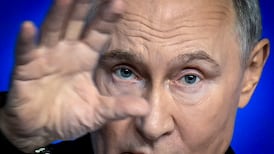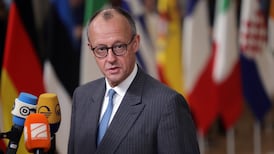On a bitterly cold December day in northern Russia, Murmansk harbour hums and clangs under a blanket of freezing fog, while a huge stone soldier gazes down from a war memorial on the snowy hillside, an eternal flame flickering at his feet.
The shrouded port is Russia’s main gateway to the Arctic and its dream of future profit and power in this strategic region, and the statue watches over a history of martial glory that is the nation’s most treasured inheritance from the Soviet Union.

Whichever direction you look in modern Russia, history is always just over your shoulder – and sometimes seems to be looming ever larger.
This year began with Russia locking up its main opposition leader, Alexei Navalny, just months after poisoners almost killed him in Siberia, and it is ending with Memorial, the country's most celebrated human rights group, facing the threat of closure by the courts.
Russia’s campaign against Navalny and supporters – his chief allies jailed or driven abroad, his anti-corruption group banned as “extremist” – and its attack on Memorial, chief documenter of Soviet crimes, confirm the scale of the repression now under way against civic groups, activists and media that anger the Kremlin.

"Not long ago we thought we'd hit rock bottom when they started labelling journalists and lawyers as 'foreign agents'," opposition politician Boris Vishnevsky told me in early November in Saint Petersburg, midway through my three-month Inside Russia assignment for The Irish Times.
“But now they want to close Memorial . . . This is the destruction of our historical memory. This is the successors to the [Soviet] executioners demanding that the names of the victims – and of their executioners – be forgotten, so the memory of these crimes is lost.”
Nine Moscow restaurants received at least one <a class="search" href='javascript:window.parent.actionEventData({$contentId:"7.1213540", $action:"view", $target:"work"})' polopoly:contentid="7.1213540" polopoly:searchtag="tag_company">Michelin</a> star when the culinary guide published its first Moscow edition in October, and the city remains a great cultural capital
The state's growing use of blacklists and jailing of "undesirables" remind its critics of the Soviet era, and the KGB security service that trained Russia's current president, Vladimir Putin, and many of his closest allies.
Change for the better
Yet that chill, so grimly familiar to many, is blowing through a country that has also changed for the better in countless ways in recent decades.
Russians are living longer, drinking less and earning much more than when Putin came to power two decades ago, and many reside in cities that have improved markedly in recent years, with new parks and pedestrian areas a common feature.
Visitors dreading rickety transport, dingy hotels, bland food and outdated technology will be pleasantly surprised: fast trains now link several cities; Russia's regional airline network is modern and extensive; good accommodation is plentiful; and excellent, affordable meals are easy to find – and to order via slick apps such as Yandex, the tech giant that also dominates Russia's online taxi-hailing market.
Nine Moscow restaurants received at least one Michelin star when the culinary guide published its first Moscow edition in October, and the city remains a great cultural capital, which celebrated the opening last week of the landmark GES-2 arts centre in a converted 1907 power station near the Kremlin.
Western sanctions imposed after Russia annexed Crimea in 2014 have not crippled the economy or dislodged Putin
GES-2 is funded by one of Russia's richest men, Leonid Mikhelson, co-owner the Novatek gas firm with another billionaire, Gennady Timchenko, who became Putin's friend in the 1990s; the US has imposed sanctions on the company and Timchenko in response to Russia's aggression since 2014 against Ukraine.
Like the Garage modern art museum in Gorky Park, which was co-founded by Chelsea football club owner Roman Abramovich, sceptics regard GES-2 as a PR exercise by the Putin-era elite, just as they saw the 2014 Winter Olympics and 2018 football World Cup – which brought rapid redevelopment to the heart of host cities – as cynical "sportswashing" for the Kremlin's tattered reputation.
Art collector and Putin critic Marat Gelman said the GES-2 project was "done fantastically", but reflects a Kremlin mindset that "looks like schizophrenia".
“Putin and his administration have this dream that they can freeze politics while still having business or art develop,” he said.
Yet so far, to a degree, the formula seems to be working.
Putin’s stability promise
Western sanctions imposed after Russia annexed Crimea in 2014 have not crippled the economy or dislodged Putin, and the government’s belt-tightening, investment in domestic substitutes for former imports, and management of a €165 billion wealth fund for its huge oil and gas profits have maintained the stability – albeit with minimal growth – that is Putin’s main promise to the nation.
"I think we should be friends with everyone," local official and business leader Boris Beloborodov told me in Blagoveshchensk, on the frontier with China.
"But if Europe thinks Russia is wrong – then fine, think that, and we'll wait until its politicians change and others take their place."

Moscow and Beijing have a long history of distrust and territorial rivalry over border areas like Blagoveshchensk, but their deepening co-operation is central to a “pivot to Asia” that is helping Russia weather economic and diplomatic fallout from the collapse of relations with the West.
China is now investing in big projects led by major Russian firms, particularly in the energy sector and with growing focus on the Arctic, where Beijing hopes close ties with Moscow will aid its plans to develop a “polar silk road”.
Fyodor Lukyanov, a prominent analyst who advises the Kremlin, told me in October that a key factor in the relationship was "growing pressure from the West on both Russia and China. Both countries feel under attack . . . and that brings them together in efforts to resist and respond."
Now China is publicly backing Russia's demand for binding security guarantees from the US, including a pledge to keep Ukraine out of Nato, and Moscow has pressed home its point by deploying tens of thousands of troops to within striking distance of its neighbour's border.
To justify today’s threats, and what some fear may be tomorrow’s war, Putin is reaching back into Russia’s past.
In July he published a long essay, “On the historical unity of Russians and Ukrainians”, in which he argued that “true sovereignty of Ukraine is possible only in partnership with Russia” and claimed “Russia was robbed” of swathes of its rightful territory when Ukraine became independent after the collapse of the Soviet Union.
This week, he described that 1991 break-up as the “disintegration of historical Russia under the name of the Soviet Union”.
“We turned into a completely different country. And what had been built up over 1,000 years was largely lost,” he complained.
It was “a major humanitarian tragedy” for millions of Russians who found themselves in newly sovereign republics such as Ukraine, argued Putin, who previously called the demise of Soviet dictatorship the “greatest geopolitical catastrophe of the 20th century”.
Soviet triumphs
While suppressing the study and commemoration of communist-era repressions by Memorial and other groups, the Kremlin dusts off Soviet triumphs – above all victory in the second World War and success in the space race – when it needs a touchstone to inspire the nation.
I got no sense that Russians want all-out war with Ukraine, or endless confrontation with the West
Russia named its first coronavirus vaccine after Sputnik, the world's first manmade satellite, and it was Valentina Tereshkova – a pro-Kremlin deputy who in 1963 became the first woman in space – who was given the job of proposing constitutional changes that now allow Putin to rule until 2036, when he will turn 84.
State television now bombards viewers with propaganda depicting Ukraine and the West as major threats to Russians, and Putin as their defender; to some observers, it feels like the Kremlin is preparing the ground for possible conflict.
But Russia’s unsuccessful promotion of Sputnik V to its own people exposed the depth of their mistrust towards officials and their messages, with the upshot that only about 43 per cent of Russians are now fully vaccinated, and the country has one of the highest Covid-19 death tolls in the world.
Despite "a backdrop of unceasing vitriol directed toward Ukraine on state television", there is no desire among Russians – especially the young – for conflict, says Andrei Kolesnikov, senior fellow at the Carnegie Moscow Centre.
“War is the business of young people and conscripts. But 66 per cent of Russians aged between 18 and 24 have a positive or very positive attitude toward Ukraine,” he says, referring to survey data from the Levada Centre.
During three months travelling around Russia, concerns about its stalling economy, dwindling democracy, climate change and the pandemic came up in conversation far more often than fears for the country’s security or rancour over the collapse of the Soviet Union.
I got no sense that Russians want all-out war with Ukraine, or endless confrontation with the West; but at the same time, after 21 years under the same ruler, they know exactly what their opinion is worth to Putin’s Kremlin.
Series concluded.










